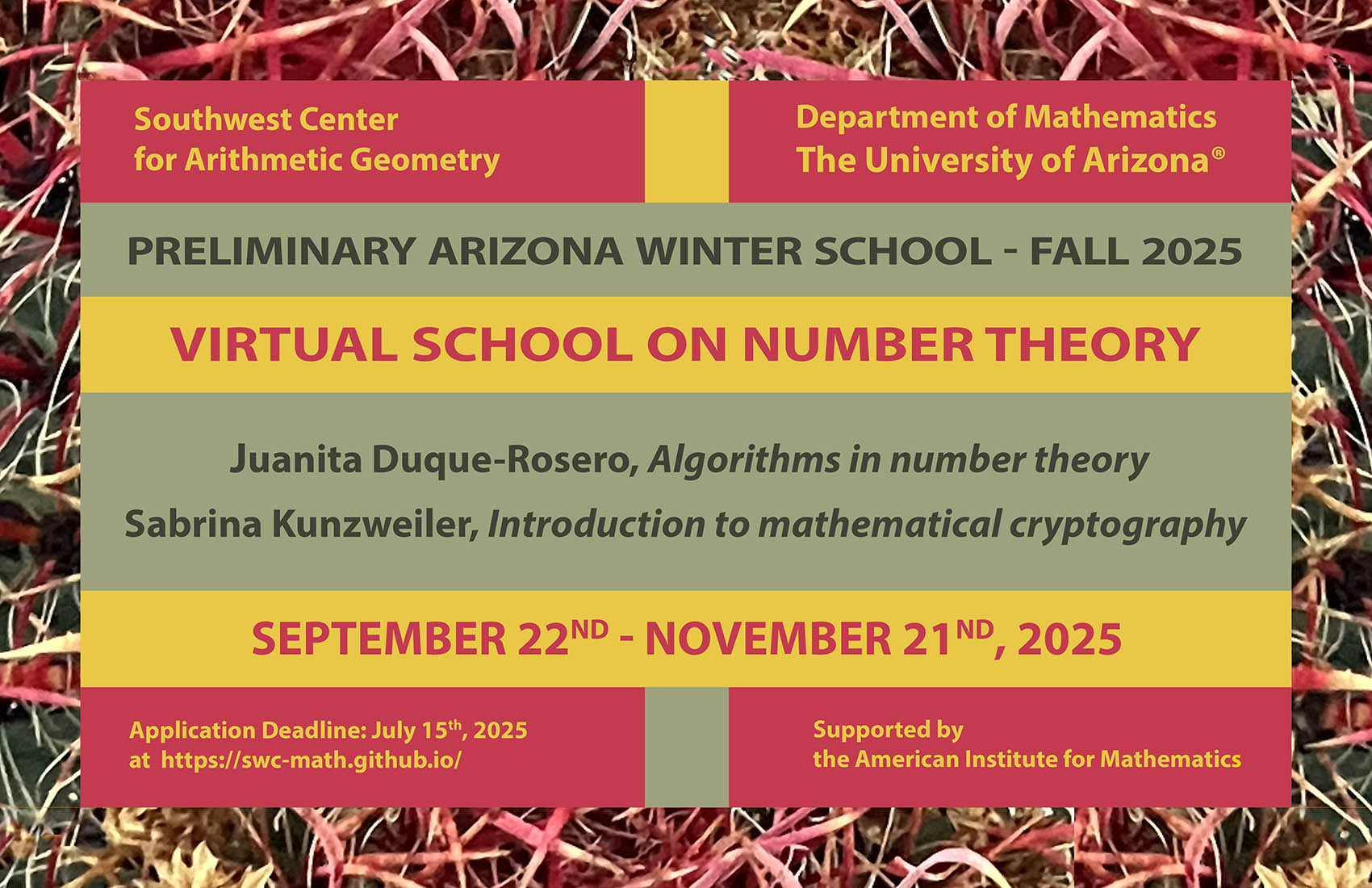Preliminary Arizona Winter School 2025: Mathematical cryptography and algorithms in number theory
The Preliminary Arizona Winter School (PAWS) is a virtual program on topics related to the upcoming AWS, with an intended audience of advanced undergraduate students and junior graduate students.
Format: The program will run for 9 weeks, alternating between 5 weeks of lectures and 4 weeks of problem sets (with a TA session)
Each lecturer will be accompanied by graduate student assistants, who will be in charge of writing weekly problem sets and facilitating weekly, hour-long problem solving and discussion meetings with groups of students.
Introduction to mathematical cryptography will assume only a first undergraduate course in abstract algebra as a prerequisite. Analysis and implementation of algorithms in number theory will assume fluency with algebra at a beginning graduate level and familiarity with the basic objects of algebraic number theory (such as number fields and their rings of integers), but will not assume any prior experience with analysis of algorithms.
The school will feature an online (Discord) discussion board where students can ask questions and interact with the speakers and assistants outside of scheduled meeting times.
We will facilitate additional virtual events, some purely social to build a community, and some more structured sessions on timely and pertinent topics like "What is graduate school in Math like?", "Tips for applying to graduate school this Fall," "How do I navigate the first year of graduate school?" "How do I look for an thesis advisor?", "How to get the most out of the upcoming AWS."
We encourage undergraduate students to take their PAWS course as an independent study with a faculty member at their home institution.
- Organizers: Renee Bell, Brandon Levin and Padmavathi Srinivasan (main organizers) with Anthony Várilly-Alvarado, Isabel Vogt and Hang Xue
- Please contact aws@swcmath.org with any questions.
- Funded by the American Institute of Mathematics.
September 22nd — November 21st, 2025
PAWS 2025 consists of two concurrent lecture series.-
Sabrina Kunzweiler: Introduction to mathematical cryptography
- Notes
- Video:
- Problem Sets:
-
Juanita Duque-Rosero: Analysis and implementation of algorithms in number theory
- Notes
- Videos:
- Problem Sets:
Cryptography is an ancient art with the goal of keeping communication
private. Modern cryptography is based on different mathematical
concepts, and in particular number theory.
This course will provide an introduction to cryptography and the
underlying mathematics. We start with an analysis of the classical
Diffie-Hellman key exchange discovered in the seventies, and proceed to
study elliptic curve cryptography which is used in many of today's
applications. Finally, we will also discuss the construction of
cryptography that is secure against quantum computers.
A goal of the course will be to get intuition on the hardness of the
underlying number theoretic problems. We will discuss attacks on
existing protocols and, apart from theoretical problems, there will also
be practical exercises using the computer algebra system SageMath.
This course will assume only a first undergraduate course in abstract algebra as a prerequisite.
The course consists of an exploration of the algorithms and computational ideas that power modern algebra and number theory. We will start with the basics: analyzing what makes an algorithm e!cient, and working through classic methods in integer arithmetic and linear algebra. These techniques will come up again and again in the rest of the lectures.
From there, we will study algebraic numbers and number fields. We will see how to represent them and do arithmetic with them. We then move on to working with rings of integers, discriminants, bases, class groups, ideals, and units. Finally, we will pull everything together with examples from quadratic fields. This will require the use of quadratic forms and even a bit about quaternions and special methods.
This course will assume fluency with algebra at a beginning graduate level and familiarity with the basic objects of algebraic number theory (such as number fields and their rings of integers), but will not assume any prior experience with analysis of algorithms.
-
Assisted by Problem Session Leaders:
Thomas Bouchet, Kate Finnerty, Asimina S. Hamakiotes, Yongyuan Huang (Duque Rosero), and Giacomo Borin, Jolijn Cottaar, Eli Orvis, Gabrielle Scullard (Kunzweiler)
